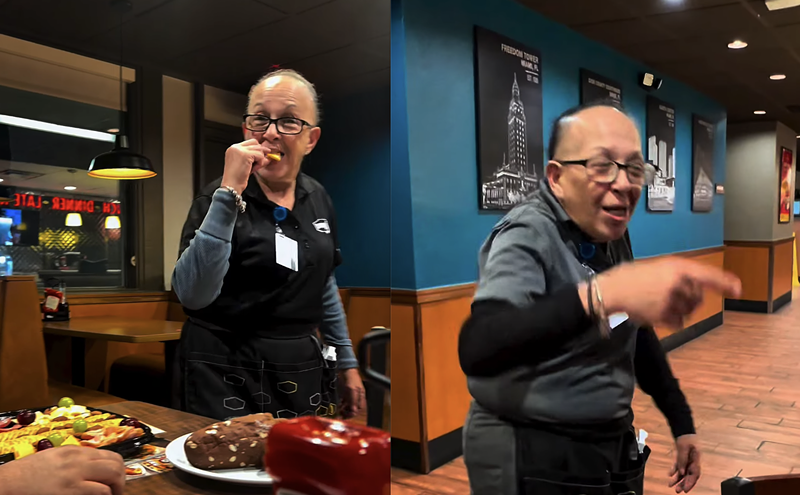Two things are certain in life. One is that death will come for every one of us. The other is that every film Michael Haneke makes will have a fair shot at the Cannes Palme d'Or. Amour, Haneke's much-garlanded latest, is set almost entirely in a well-appointed Paris apartment, amid the cathedral hush that is the director's preferred working condition. As ever, Haneke shoots in a style that is reserved and restrained — in a word, cold. Although it is in color, I remember Amour in black-and-white.
Endemic to Haneke's dry, ratchet-turning movies is the anticipation of an Inevitable Awful Event — let's call it the "IAE" — an event in which the incipient horror of the human condition pops out from behind the veneer of civilization, an event that the veteran Haneke viewer understands, upon going in, is part of the contract. The IAE breaks the brittle surface of Haneke's style, and the bracing plunge after the crack of the ice delivers a harsh lesson. His pedantic, castigating filmmaking is a vehicle for these lessons, which have never yet confirmed man's high opinion of himself. The unit of the shot or the scene is rarely a source of pleasure or pain or conflict or resolution or beauty or individual life, only a flat and neutral plane against which the harsh truth can stand out all the more starkly.
With Amour, Haneke places his IAE out front. The police burst into a locked apartment and discover a corpse — skin purplish-white and crumply like parchment, neatly laid out on a bed — that appears underneath the film's title.
After this opening, which leaves little doubt as to what's in store, we're introduced to an elderly couple, Georges and Anne. She looks familiar; so does their bedroom. But for now, they are happy, returning home from a piano concert to their bastion of civilized mutual contentment. (There is a vague threat from the outside world — someone has recently tried to jimmy their front door.) As with the couple playing a guessing game with opera CDs at the beginning of Haneke's 1997 Funny Games, Georges and Anne's natural environment is the world of high culture; she is identified as a former piano teacher, like Isabelle Huppert in The Piano Teacher, and Huppert appears here in a supporting role as the couple's middle-aged daughter. Furthering the sense of continuity, this Georges and Anne are the latest link in a chain of Georgs/Georges and Annas/Annes who have run through Haneke's filmography, as Claude Chabrol rearranged the triumvirate figures of Hélène, Paul, and Charles through his work of the late '60s and '70s.
Amour begs such comparisons to the Euro art house heyday, for Anne is played by 85-year-old Emmanuelle Riva (Hiroshima Mon Amour), and Georges by 81-year-old Jean-Louis Trintignant (My Night at Maud's, The Conformist), and our memories of their past films color our response to the all-too-familiar tragedy that they will endure, seen in detailed, clinically documented stages. Georges and Anne's long connubial harmony, which their daughter's memories attest to, is thrown into discord when health problems suddenly leave half of her body collapsed and useless. This is the first in a succession of attacks that forces Georges to minister to his diminishing wife through her slow decline, his fierce will for her to live pitted against her increasing will to die. Haneke elides the moments of crisis, focusing instead on details of daily caretaking, the process by which a home slowly becomes a hospice. I don't recall the words je t'aime being spoken in the two hours of Amour, but they are constantly reiterated in acts of consideration, tenderness, and tending to toilette.
An intensely private actor capable of almost embarrassingly confessional moments, Trintignant is at his most touching as a man vainly trying to decipher his wife's blurred speech so as not to let go the thread of their lifelong rapport ("There are so many stories I never told you," he says). When Georges dismisses a condescending nurse to defend what's left of his wife's violated dignity, the outrage blazing from his eyes attests to Trintignant's undiminished power.
This humble yet soulful performance is a triumph over not only the humiliation of sickness but also the punitive monotony of Haneke's cinematic deathbed vigil, filmed in static compositions that stare through the apartment's nested series of doorways as Georges putters in and out of frame. The centerpiece involves Trintignant chasing a stray pigeon trapped in the apartment, presumably significant of his wife's soul (I hesitate to use the word with regard to such a flatly materialist film), longing to be set free from earthly fetters.
Haneke's elegant reserve is meant, perhaps, to allow viewers the space to contemplate the leering face of death, a sort of cinematic memento mori. During the film's lulls, I found myself remembering movies, thanatological and otherwise, that had given me something more to chew on: A snatch of Schubert's "Impromptu in G-flat Major D899 No. 3" in Amour recalled the same piece's use in Bertrand Blier's 1989 Too Beautiful for You; the process of slow physical breakdown depicted through abrupt narrative jumps, Maurice Pialat's ferocious 1974 Le Gueule Ouverte; the subject of an aging couple, Leo McCarey's 1937 Make Way for Tomorrow, a film so mawkish as to suggest there might be something worthwhile in sharing one's life with someone else before the return to dust. This year alone already brought Yorgos Lanthimos's Alps, a mysterious, funny-sad film poking around the empty spaces left by death.
In keeping within its limited boundaries, in applying an unflinching style to an inevitable process, Amour has a certain perfection to it, but what Haneke expresses thereby — that culture is no protection from the final horror, that death be not proud — is so meager as to make it a single-minded, barren perfection. Haneke remains, by his rules, infallible. So what? A movie in which incident is as spare as it is in Amour certainly can be great; a movie in which ideas and feelings are so sparse cannot.








